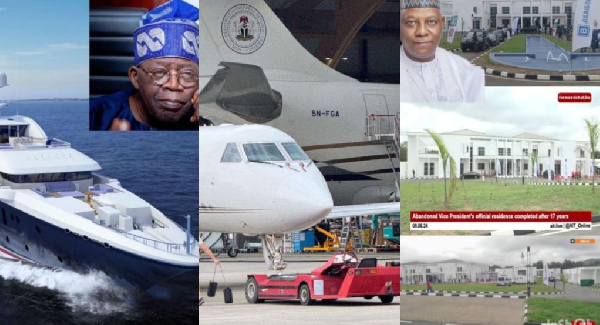Tinubu Administration’s Extravagant Expenditures: N150bn Jet, N5bn Yacht, and More
Widespread anger continues to simmer over the Bola Tinubu administration’s recent acquisition of a new presidential jet.
The government’s decision to spend over N150 billion on the aircraft has sparked outrage, particularly at a time when Nigerians are struggling with severe economic challenges and a persistent cost-of-living crisis.
Mr. Tinubu’s policy choices, such as the removal of fuel subsidies and the unification of exchange rates, have led to soaring prices of essential goods, contributing to the current inflationary pressures.
Despite repeatedly asking Nigerians to endure the hardships caused by these policies, the government seems unwilling to heed its own advice, with inflation now at a staggering 33 percent.
In this analysis, PulseNets examines some of the most extravagant expenditures made by the current administration.
Presidential Jet
The newly acquired Airbus A330, replacing the 19-year-old Boeing B737-700(BBJ) from Olusegun Obasanjo’s tenure, reportedly set the Nigerian government back by over $100 million.
The government’s approval for this luxury purchase, secured through the House Committee, has been widely criticized as tone-deaf to the struggles of ordinary Nigerians.
Although the National Assembly claims that funding for the jet has not yet been appropriated, the president has already used it for a trip to France.
Meanwhile, Senate President Godswill Akpabio has indicated his willingness to approve any requests to finalize the purchase.
Former Minister Oby Ezekwesili expressed disbelief over the government’s priorities, questioning how acquiring a luxury aircraft could be a top concern amid widespread hunger and poverty.
Presidential Yacht
Last year, the administration faced backlash over its plans to purchase a presidential yacht.
President Tinubu included a N5 billion allocation for the yacht in the 2023 supplementary budget of N2.17 trillion.
Public outrage eventually led the National Assembly to reject the proposal, redirecting the funds elsewhere.
However, multiple sources suggest the yacht had already arrived in Nigeria, though the government has remained silent on the matter.
PulseNets has learned that the House of Representatives is now urging the Navy to return the vessel to the vendor.
N21 Billion Residence for Shettima
Another contentious expenditure is the reported N21 billion spent on completing the Vice President’s official residence.
Despite other pressing infrastructure needs, the Minister of the FCT, Nyesom Wike, prioritized this project.
Despite public disapproval, the minister went ahead and completed the residence.
N160 Million Vehicles for National Assembly Members
In the midst of economic hardship, members of the National Assembly received luxurious Sport Utility Vehicles, each reportedly costing N160 million.
While the House claims these vehicles are official and to be returned at the end of the administration, PulseNets has learned that some lawmakers opted for cash instead.
N90 Billion Hajj Subsidy
The government also allocated N90 billion to subsidize the 2024 Hajj pilgrimage to Saudi Arabia.
With the naira’s devaluation, the cost of the pilgrimage soared, forcing the National Hajj Commission of Nigeria (NAHCON) to repeatedly revise the fees.
Also Read: FBI announces death of Lee Andrew Edwards, Bola Tinubu’s consigliere in Chicago drug ring
The government’s subsidy has since become the subject of investigations by various anti-corruption agencies, with NAHCON Chairman Jalal Arabi and several staff members being detained by the EFCC for allegedly mismanaging the funds.
N1.5 Billion for First Lady’s Office
The Office of the First Lady, often criticized for its significant influence despite being an unelected position, has also come under scrutiny for its costs.
In the 2023 supplementary budget, the government proposed N1.5 billion to purchase vehicles for the office, raising further questions about spending priorities.













